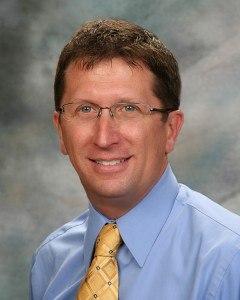Richard Knabb, the tropical weather expert at The Weather Channel, will be the next chief of the U.S. government’s hurricane forecasting hub in Florida, federal officials said Friday.
The promotion to director of the National Hurricane Center in Miami fulfills a childhood dream for Knabb, who grew up in Coral Springs and Katy, Texas, and later was a forecaster at the center.

Knabb remembers watching the hurricane center’s director on local television news as Hurricane David aimed at Miami in 1979. The storm eventually swerved and made landfall farther north in Palm Beach County, but Knabb was hooked on the tropical storm forecasts.
“Largely that came out of personal, childhood fear. I wanted to be able to figure out how to forecast those things myself because they posed such a danger to folks in hurricane-prone areas,” said Knabb, 43. “From that point forward I think I knew that that was what I was going to end up doing as a career.”
Knabb started working at the hurricane center in 2001. He was a senior hurricane specialist at the center from 2005 to 2008, experiencing what other longtime forecasters called “decades of hurricane activity in just a few years,” thanks to the overactive and devastating 2004 and 2005 seasons.
“I was living the hurricane problem while I was helping others prepare for the hurricane problem,” Knabb said.
Knabb is already cautioning coastal residents to be prepared.
“One of these days another major hurricane is going to come to the U.S., and we need to be prepared. And that starts with me and my family,” Knabb said. “We’re going to be living in South Florida again, and we have to have a hurricane preparedness plan for our home and our family. And that will be just one of the examples I’ll try to set for personal preparedness.”
The 2011 Atlantic hurricane season was the sixth consecutive year without the U.S. landfall of a major hurricane. Those are storms classified as Category 3 or higher, with top winds of at least 111 mph. The National Oceanic and Atmospheric Administration is set to release its hurricane season outlook next week.
“At the helm, (the center’s) director must be the cool and calm voice that conveys this array of information that prompts life-saving actions from an individual to across all levels of emergency management and even internationally, and I firmly believe that our next director embodies this reputation,” said NOAA Administrator Jane Lubchenco.
After leaving the hurricane center, Knabb served as the deputy director of the Central Pacific Hurricane Center in Honolulu. He joined The Weather Channel in 2010.
Knabb will replace Bill Read, who steps down as director June 1, the official start of the six-month Atlantic hurricane season.
Read’s retirement after four years as director is much calmer than his entrance in 2008. He replaced Bill Proenza, who only held the job for six months after replacing the popular Max Mayfield. Most of the center’s staff called for Proenza’s dismissal after they said he exaggerated problems with an aging weather satellite and undermined forecasters.
Earlier this week, Read said his successor would face the same challenge that has perplexed forecasters since Hurricane Andrew’s catastrophic Florida landfall in 1992: how to see how big a storm will be well in advance or whether a storm will rapidly strengthen into a major threat.
Knabb said NOAA’s Hurricane Forecast Improvement Project is showing signs of solving that and other forecasting problems. He also praised Read’s leadership and said he was eager to reunite with the hurricane center staff.
“I think they’re in a really good place right now,” he said.
Other hurricane specialists who work outside the National Hurricane Center applauded the selection of Knabb for one of the toughest jobs in weather forecasting.
Knabb is well qualified for the job, said Kerry Emanuel, an MIT meteorology professor who specializes in hurricanes.
“That job requires a terrific amount of energy and enthusiasm. It tends to burn people out. It’s good to choose a young person who has a lot of energy and experience,” Emanuel said.
Knabb not only has the scientific credentials to lead the hurricane center, he also understands the importance of the job’s communications aspect, said Heidi Cullen, a climatologist at the nonprofit Climate Central in New Jersey and a former climate expert for The Weather Channel.
“This is someone who is incredibly experienced and knows how to handle the really, really intense situation of broadcasting during hurricane landfall,” said Cullen, adding “you want someone who is not going to overhype a situation and really can communicate the risks and uncertainties.”
(AP Science Writer Seth Borenstein contributed to this report from Washington.)
Was this article valuable?
Here are more articles you may enjoy.

 Charges Dropped Against ‘Poster Boy’ Contractor Accused of Insurance Fraud
Charges Dropped Against ‘Poster Boy’ Contractor Accused of Insurance Fraud  Elon Musk Alone Can’t Explain Tesla’s Owner Exodus
Elon Musk Alone Can’t Explain Tesla’s Owner Exodus  Navigators Can’t Parse ‘Additional Insured’ Policy Wording in Georgia Explosion Case
Navigators Can’t Parse ‘Additional Insured’ Policy Wording in Georgia Explosion Case  Cape Cod Faces Highest Snow Risk as New Coastal Storm Forms
Cape Cod Faces Highest Snow Risk as New Coastal Storm Forms 